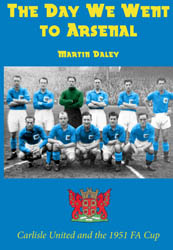Despite living up north near Carlisle I keep encountering Gooners and recently I’ve read a new book entitled The Day We Went To Arsenal about the FA Cup game in the third round of 1951 when Carlisle United were drawn away to Arsenal. The book is written by a Carlisle man, Martin Daley, who tells us he always has been a follower of Arsenal, one of several fascinating links in the book between the two otherwise very different institutions.
As Daley stresses there are two things to remember about the draw in 1951: the FA Cup had a glamour and a fascination that it has lost, though efforts are made these days to recover some of that, and Arsenal were quite the biggest club in the world. 1951 was long before the days of Real Madrid or Manchester United and what Arsenal achieved in the 1930s had given them glamour and fascination too. As well as that, in 1951 Arsenal were the Cup holders, following their victory over Liverpool in May, 1950. Everyone wanted to play Arsenal, very few could beat them, and certainly no-one thought a Third Division North outfit from somewhere called Carlisle, even though they led the table, had a prayer – no-one, that is, except their manager, Bill Shankly. Shankly had played for Carlisle before joining the very successful 1930s Preston, and managing Carlisle was his first job. Over the years he has several times been a thorn in the side of Gooners. His motto was, and always remained, the same: the fans are the people who matter. For this he was loved in 1951 in Carlisle and later at Liverpool. He had also played several times for Arsenal during the war, another of the over-lapping strands in the story. The match became the event in Carlisle, the first thing that had dispersed the post-war greyness and gloom, the rationing, the monotony, which had descended on the country as we struggled to realise that we had won the war and might expect to enjoy our freedom.
Those were the days of railway travel to matches - £2 return Carlisle-London – of tickets at 1/6 (7p) and of those Cup specialities pre-match, in this case hounds unleashed at the Clock End yelping excitedly as they followed a trail laid to the North Bank, with “John Peel” in hunting gear sounding his horn, all provided by the away support. An afternoon kick-off, of course. Carlisle didn’t beat Arsenal but they came mighty close, drawing 0-0 on January 6th at Highbury. Many thought them unlucky not to win, and Ted Platt in the Arsenal goal, had to produce a wonder save in the last five minutes to stop them doing so. They drew much praise, from the press and from the write-up in the next Arsenal programme, if not from the Arsenal players, for the way they had played – ball to feet, slick passing, etc. Half Carlisle turned up at the station on the Sunday afternoon to hail their heroes home. The city fathers thought a few people might enjoy watching the replay; in the event the queues for tickets got out of hand and the sale had to be aborted. After things were re-arranged for the following day, 21,215 watched the game – that was 6,000 more than the average crowd for the home team, whose crowds were impressively large, like Liverpool’s second division crowds under Shankly ten years on. “A manager has got to identify himself with the people who come through the turnstiles.”
Tom Whittaker took the opportunity of Mercer’s absence through illness to put Alex Forbes at left half to deal with Billy Hogan, the brilliant dribbling winger who had tortured Arsenal’s defence in the first game. Hogan did not have the opportunity to do that again. He remarked afterwards: “Arsenal meant business this time”. It could be brutal in those days: Carlisle’s leading scorer and centre-forward, who missed the cup-ties through injury, had all his teeth removed after signing his first professional contract, for he knew what would be coming. “And he had a lovely set of teeth,” his mother sadly commented.
As for the game, Arsenal took the lead but Carlisle equalised and were pressing for a second when Wally Barnes made a flying save with his fist to keep out a shot and the referee didn’t see it (there’s a good picture of the “save” in the book). Instead, Arsenal re-took the lead after a goalmouth scramble. The Carlisle keeper, Jim McLaren, who had been brilliant at Highbury, made a couple of errors, one to let Arsenal score first (Reg Lewis) and the second to let them go 3-1 up (Lewis again) and Arsenal eventually ran out 4-1 winners (Logie and Goring were the other scorers). Carlisle did not go on to win the promotion their football and support deserved, and Arsenal didn’t retain the cup – nor did this biggest of clubs win the league in 1951, though they had been all-conquering up until December. They were, however, back at Wembley in 1952 and came close to pulling off the double that season. The two teams have met twice since in the Cup but neither contest had the thrills or the tension of the tie in 1951.
The Day We Went To Arsenal by Martin Daley, JMD Media, £14.99







